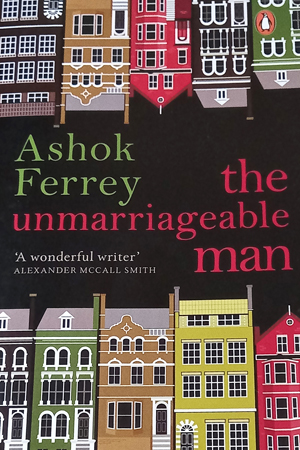Ferrey at his best in storytelling
View(s): Ashok Ferrey has written four novels to date. In all of them, the cast of characters is drawn mainly from two countries: England and Sri Lanka. Hence, they could be viewed as cross-cultural novels where the colonial experience serves as a template for blending life in middle-class England with that of middle-class Sri Lanka. The product is a mosaic of memories, feelings and emotions that stirs the imagination.
Ashok Ferrey has written four novels to date. In all of them, the cast of characters is drawn mainly from two countries: England and Sri Lanka. Hence, they could be viewed as cross-cultural novels where the colonial experience serves as a template for blending life in middle-class England with that of middle-class Sri Lanka. The product is a mosaic of memories, feelings and emotions that stirs the imagination.Ferrey possesses the ability to capture nuances of mood and atmosphere through the use of painterly prose rather like an artist who uses impressionist brushstrokes to produce effets de soir. Painterly prose is Ferrey’s trademark. The more he writes, the richer it gets in respect of tone, texture, and poetic imagery. Telling a good story is not a science; it is an art, and in The Unmarriageable Man (his new novel), Ferrey takes it to new heights. The novel is so poignant, humorous and entertaining that one can only marvel at its expert craftsmanship.
The reason why England figures so prominently in his novels, their distinct Sri Lankan flavour notwithstanding, is that he lived there for many years prior to returning to his homeland for good. Ferrey (who holds a degree in mathematics from Oxford) is also influenced by the fact that British colonial rule affected practically every sphere of life in Sri Lanka. It is difficult to imagine what kind of culture would have evolved in this island if Dutch colonial rule had not been superseded by British colonial rule; in other words, no English, no cricket, no rugby, no Ceylon tea, no Victorian architecture, and no Westminster-style democracy!
Would Ferrey, who belongs to Sri Lanka’s western-educated, English-speaking elite, be writing stylish English novels if Sri Lanka had never become a jewel in Queen Victoria’s crown? I doubt it. If his command of English prose is impeccable, it is because he spoke English at home and went to elite English-speaking schools (overseas). But he had to wait till his hair started turning grey to discover that he’s a born storyteller. Ever since publishing his first book in 2004 (a fine collection of short stories entitled Colpetty People), he has gone from strength to strength and is now at the peak of his creative powers.

Ashok Ferrey
His stories are rather like embroideries on canvas with strands of astute satire and delectable prose woven neatly interwoven into uncommon motifs and designs. If you expect his books to be intellectually stimulating, you’re likely to be disappointed. But I suspect the majority of readers on this planet are not into ‘cerebral’ novels. If a master Sri Lankan storyteller is the kind of author you’re seeking, then Ferrey is your man. Both his novels and short stories are light, entertaining, and fast-moving with a liberal sprinkling of satire. It is this ability to view the local bourgeoisie through the lens of social satire that sets Ferrey apart from other Sri Lankan writers. His stories are absorbing, even compelling at times, and many of them have a surprise ending.
A novel that embraces several themes and holds your attention from beginning to end is likely to satisfy your emotional palate. When I finished reading The Unmarriageable Man, the conclusion I arrived at is that the book has more depth and class than Ferrey’s previous novels. It is also more mellow and introspective than the others. The plot, with its clever twists and turns and gentle oscillations, is a judicious blend of fiction and non-fiction with the author drawing heavily on his personal experiences in England and Sri Lanka (prior to marriage) to give it immediacy and emotional depth. Though the novel is compact, the story of Sanjay de Silva, a young man from Colombo’s bourgeois community who, shortly after his father’s death, migrates to England only to discover that life in South London is by no means a bed of roses is quite weighty in terms of thematic and emotional content. Sanjay (the product of a mixed marriage) is faced with insurmountable odds in his efforts to become a successful builder, but so determined is he to achieve success that he sets about clearing the hurdles one by one. What makes the book a page-turner is all the ups and downs he encounters along the way.
The cast of characters, comprising a mix of Sri Lankans and Brits (white, brown, black), is quite large. Some of them are utterly intriguing, especially Sanjay’s ghostly companion in England, who happens to be his dead father. We are told that Sanjay lost his English mother at a young age, which is why she is hardly mentioned in the novel. But there’s a little twist in the tail I dare not reveal.
Though most of the action takes place in a single year (1980), the novel has a complex, non-linear structure with flashbacks occurring at regular intervals to highlight its contextual elements. The story is written mainly in the past tense, but the insertion of the present tense at key points is a technique the author handles with consummate ease. There are several sub-themes such as cozenage and deceit, kindness and empathy, and the struggle for survival in a cruel and merciless world. But it is the over-arching theme of grief arising from mental and physical suffering as well as personal loss that gives the story solidity as well as cohesiveness.
As a creative writer, Ferrey possesses the capacity to blend technical finesse with artistic flair in such a way as to imbue his narrative with a magical quality. To illustrate this point, we shall conclude with a quote from p. 31 of The Unmarriageable Man: “It is strange how your world can flip in just one instant from its sparse but essentially well-ordered self: into one of whirling chaos, perfumed by anaesthetic and disinfectant, presided over by brazen nurses in short skirts and severe matrons in long; a world of plastic folders and perpetual motion, of steps echoing down corridors blue-lit and unearthly.”
| Book facts | |
| An Unmarriageable Man by Ashok Ferrey Reviewed by Seneka Abeyratne |



